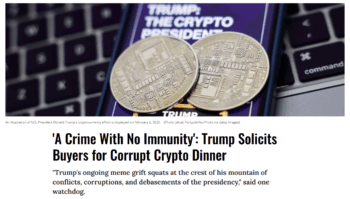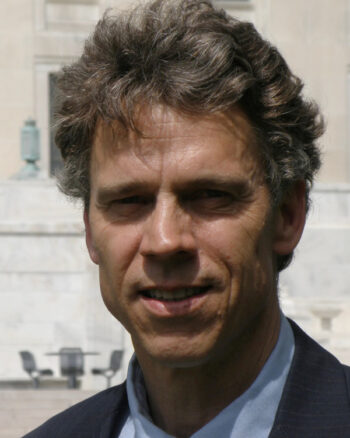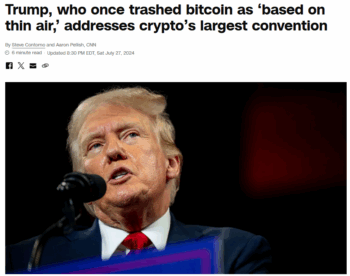Janine Jackson interviewed Public Citizen’s Bartlett Naylor about Trump’s crypto grift for the May 9, 2025, episode of CounterSpin. This is a lightly edited transcript.

Common Dreams (5/6/25)
Janine Jackson: I read, thanks to Jake Johnson at Common Dreams, that Trump is planning a fancy private dinner for top investors in the $Trump meme coin. It has a dollar sign in front of it, but I don’t know how to pronounce that. But it’s the crypto token that is enriching him hand over fist, and with other crypto-related investments, has reportedly gifted the Trump family $2.9 billion in just the last six months.
I would be ashamed, but I believe that a lot of listeners are with me as I ask, “Huh? It’s a what? That’s doing what?” Here to help us make sense of what’s happening, and why it matters, is Bartlett Naylor. He’s financial policy advocate at Congress Watch, part of the indispensable group Public Citizen. Welcome back to CounterSpin, Bart Naylor.
Bartlett Naylor: Many thanks for having me.
JJ: What’s a meme coin? And why would anybody pay money for it?
BN: I don’t know and I don’t know!
So a meme coin is generally a term of derision within the cryptocurrency community for a coin that is simply developed as a joke to make fun of something, to take advantage of an internet theme. Folks have heard of Bitcoin, and a meme coin, like Bitcoin, is simply a digital receipt that you paid money for something. It’s not shares in a company that is an enterprise that, ideally, would make a profit and pay you a dividend. It’s just a digital receipt. With Bitcoin, you could sell that to somebody else, and if they paid you more than you paid for it, you’d make money.

$Trump marketing website
And that’s the idea with Trump’s meme coin, which surprisingly, for such a selfless guy, he named $Trump. So when you buy one, you are basically sending him money, and you’re also having a trading fee, which is where he’s actually made most of his money, which also goes to Donald Trump.
You get nothing, according to him. He even says on the website, “This is not an investment opportunity. You should do this to celebrate me, to celebrate my leadership, my willingness to fight, fight, fight.”
And he announced a few weeks ago that those 220 that buy the most will be invited to a dinner with him. It’s been a little unclear, sometimes he says the White House; other times he says it’s a golf club near Washington, DC.

Middle East Eye (5/1/25)
For background: you can’t do this. The law forbids the president from soliciting gifts. The law also forbids the president from accepting gifts from a foreign state, and this $2 billion that you had mentioned is coming from the United Arab Emirates, a sovereign fund in Dubai, and they’re going to use a separate cryptocurrency called the stablecoin. And, again, that’s a coin that is tied to a fiat currency such as the dollar. One Trump stablecoin equals $1, which basically, when you sent him that, you’re giving him an interest-free loan.
JJ: Soliciting gifts—you’ve just said it, but soliciting gifts is a crime, right? And you wrote to the DoJ, you and others wrote to the DOJ and the Office of Government Ethics, to say just that.
BN: Exactly. And so we are waiting on the edge of our seat that Pam Bondi will file a federal indictment of the president. I speak in jest, of course, and Trump controls the federal prosecutors. So for another three years and ten-ish months, nine months, we will await actual accountability for this.
JJ: I mean, just to be clear, there are laws. I know that our minds are all blown, but there are laws, there are precedents, there are things to rely on. And, you know, I wasn’t a fan of the status quo. I don’t want to return to bipartisan gentility, but there are things where you think, “Wow, I didn’t even know that we needed a law to prevent that, because no one’s ever tried to do that.” Where are we, in terms of response and resistance?

Bartlett Naylor: “A number of senators have called this the biggest corruption in presidential history.”
BN: A number of senators have called this the biggest corruption in presidential history, called for federal prosecution. Senator Ossoff of Georgia, Chris Murphy of Connecticut, Senator Blumenthal, also of Connecticut, have called for an investigation by the Permanent Subcommittee on Investigations. There are calls for this. But of course, we have a captured Congress, a captured Republican Party, and now a captured Justice Department that will not act.
JJ: Well, what would you ask from journalism at this point? It’s strange times that we’re in, and we want to acknowledge that some of the groundwork has been laid in previous administrations. But at the same time, something new is happening. And I just wonder, finally, what you would ask from reporters on this.
BN: Ongoing attention to this crypto grift. Because the two main stories of political influence in the 2024 election were the $280 million by Elmo Musk, to basically buy himself a co-presidency for a while. But the second was a hundred and some million dollars spent by the crypto industry, mostly to defeat anti-crypto lawmakers, the most prominent being Sen. Sherrod Brown of Ohio. And that has sent a chill through all of Congress, and especially Democrats, who otherwise would responsibly be jaundiced about cryptocurrency, but they are voting in favor of it.
There’s going to be a vote today. We actually don’t know the outcome, but it may well enable and give federal imprimatur to the cryptocurrency stablecoin, the kind that Trump just unveiled, this billion-dollar deal with Dubai. And they’re doing that because they’re afraid of political spending from the crypto industry.
The advertisements paid for by the crypto industry don’t say, “Vote for Bernie Moreno because he’s pro-crypto, and vote against Sherrod Brown because he’s anti-crypto.” No, the political spending doesn’t mention crypto at all. It mentions something else, some problem that they made up about Sherrod Brown, or Katie Porter in California, or something else.
Other PAC’s have done the same thing. If their own issue isn’t particularly popular, they pick something else. But voters need to know that crypto is the biggest bad corruption issue with Trump, and they should hold their lawmakers to account if they enable it.
JJ: I’d like to end right there, but I just need to ask you—somebody is like, “What the hell is crypto? What is it that I’m concerned about?” Do you have your quick explanation for people who don’t even know where to start with this issue?

CNN (7/27/24)
BN: I would call it thin air, a Ponzi scheme. Cryptocurrency was devised by an anonymous person in 2008, as somehow a way to have a payment system that doesn’t rely on banks. And if we all just use his currency, Bitcoin, then we wouldn’t have to rely on the mega banks that crashed the economy in 2008, like JP Morgan. There would be a limited amount of them, and we would just use that.
In fact, it has not caught on, for a number of reasons, as a currency. It takes a ridiculous amount of energy to validate the transaction between, let’s say, you and me, and it’s unwieldy. But, again, I will call cryptocurrency thin air.
And I’m actually quoting President Trump of 2018. He also understood that cryptocurrency was a big nothing. He has since realized that he can personally make a lot of money, so he’s grifting away.
JJ: Yep. Times have changed. Well, thank you very much for that.
We’ve been speaking with Bart Naylor of Congress Watch at Public Citizen. They’re online at Citizen.org. Thank you so much, Bart Naylor, for joining us this week on CounterSpin.
BN: Thank you for having me.
This post was originally published on FAIR.